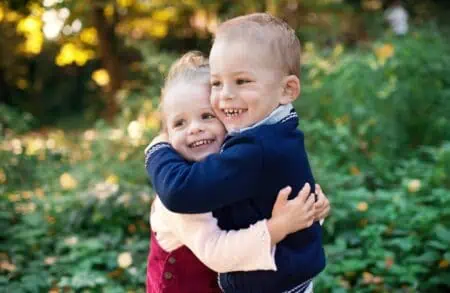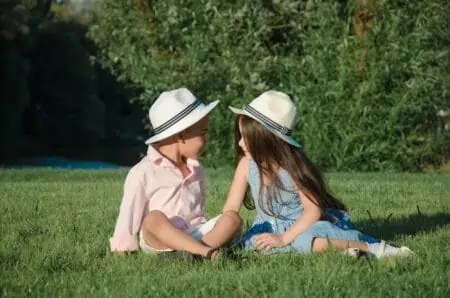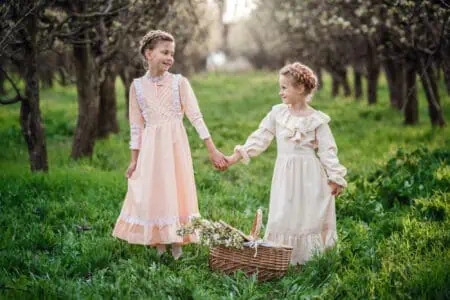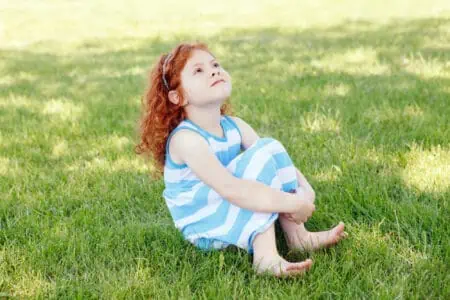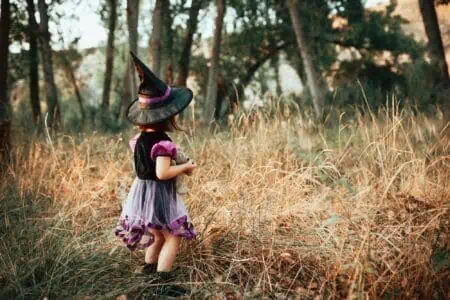Last names that start with B are bold, beautiful, and brilliant. The second letter of the alphabet is the catalyst for some of the most imaginative names, beginning with B. We scoured the globe, taking inspiration from Hawaiian, Hebrew, Old English, German, French, and Latin surnames to bring you the most diverse list.
So, strap in as we embark on a blissful journey through the beautiful world of last names, starting with B.
435 Stunning Surnames Starting With B
We have every B name imaginable, from Brown and Blanco to Brandon and Benedict!
- Babb – this ancient Anglo-Saxon name refers to someone from “the Hundred of Babegh” in England.
- Babcock – a matronymic Old English name referring to the “son of Bab or Barbara.”
- Baca – our first Albanian entry, meaning “eldest brother” or “father’s brother.”
- Bach – many last names that start with B are German – means “dweller by a stream.”
- Bachman – a combination of Yiddish and German, meaning “stream or creek” and “man.”
- Bacon – derived from the French Bacun, meaning “to fight or dispute.”
- Bader – a cool celestial Arabic name meaning “full moon.”
- Badley – from the Old English “brad” and “leah,” meaning “broad meadow.”
- Badosa – this ancient Catalan name means “fir-tree grove.”
- Baer – a short and sweet High German name meaning “bear.”
- Baez – a well-known Hispanic name meaning “son of Pelayo.”
- Baggett – this English name stems from Norman and German and means “to fight.”
- Bagley – derived from the Old English name Bacga and “leah,” meaning “bacga’s woodland clearing.”
- Bail – a topographic Old English name for “someone living by the outer castle walls.”
- Bailey – this Old English name has several meanings, from “berry clearing, bailif” to “city fortification.”
- Bain – a cool Gaelic boy’s name meaning “white and fair.”
- Baker – from the Old English “baecere,” meaning “to dry with heat;” this name describes a “baker.”
- Balderas – derived from the Spanish Baldear, meaning “to wash the deck” or “to annoy.”
- Baldwin – is of Old German and English origin, meaning “brave” and “bold friend.”
- Bales – an alternative spelling of Bails, meaning “dweller by the outer castle walls.”
- Ball – stems from the Old English “bealla,” meaning “bald.”
- Ballard – of Old Norse and German origin, meaning “brave, strong” and “round-shaped.”
- Ballesta – a classic patronymic Spanish name meaning “son of the crossbowman.”
- Ballesteros – derived from the Spanish Ballestero, meaning “crossbowman.”
- Bancroft – this Old English habitational name means “field of beans.”
- Banda – a Spanish habitational name referring to a “side, edge,” and “part.”
- Banford – an Old English place name referring to a “wooden river crossing.”
- Banks – a gender-neutral Old English name meaning “edge or bank of the river.”
- Banuelos – a typical Spanish name meaning “baths.”
- Baptiste – this Latin name derived from “baptisma,” which means “one who washes.”
- Barajas – a unisex Spanish name describing a “watering place.”
- Barba – this 5-letter Catalan, Italian, and Portuguese name means “beard.”
- Barbee – derived from the ancient Latin/Greek “barbarus,” meaning “foreign woman.”
- Barber – an occupational medieval French name meaning “beard.”
- Barbour – this Old French name is occupational and means “barber.”
- Barfield – a habitational Old English name meaning “farmland near a riverbank.”
- Barker – an occupational Old English name for a “tanner of leather.”
- Barkley – of Old English and Scottish origin, meaning “birch tree meadow.”
- Barksdale – this English name describes someone “living near a birch valley.”
- Barlow – a cool Old English geographical name describing “a bare hill.”
- Barnard – is of Old German and French origin, meaning “brave and strong bear.”
- Barnes – the perfect Old English name for someone “working in or near a barn.”
- Barnett – this Old English topographical name refers to a “burned clearing.”
- Barney – is of Slavic and German origin, meaning “defender” and “strong as a bear.”
- Barnfield – comprised of Barn and field, this Old English name means “a barn in a field.”
- Barnhart – a German name meaning “descendant of Bernhard (bear and strong).”
- Barr – of Scottish and Gaelic origin, meaning “poet” or “singer of ballads.”
- Barragan – this Spanish name means “strong or brave man/warrior.”
- Barraza – possibly meaning “bass” in French or “pole and post” in Spanish.
- Barrera – a Spanish habitational name describing a dweller who “lives near a muddy or clay area.”
- Barret – of Germanic and Norman-French origin, meaning “strife” and “mighty bear.”
- Barrios – a Spanish habitational name referring to many “outlying suburbs.”
- Barron – a regal Old English name meaning “nobleman.”
- Barrow – this Celtic and Old Norse name means “promontory (high point)” and “island.”
- Barrowman – derived from Anglo-Saxon tribes, meaning “servant at the manor house.”
- Barry – a gender-neutral Irish name meaning “fair-haired.”
- Barth – this Aramaic name means “son of Talmai (the farmer).”
- Bartholomew – an Aramaic regal name meaning “abounding in the furrows.”
- Bartlett – similar to Barth, but also means “son of Ptolemy” in Hebrew.
- Bartley – a masculine Scottish/English name meaning “birch tree meadow.”
- Barton – this Old English and Hebrew name means “barley settlement.”
- Bass – a cool 4-letter gender-neutral name meaning “tall or big” and “the fish.”
- Basset – an Old French family name meaning “of low stature.”
- Batchelor – derived from the Latin “baccalarius,” meaning “young knight” or “novice at arms.”
- Bateman – derived from the Anglo-Saxon “bat,” meaning “boat,” describing a “boatman.”
- Bates – similar to Bateman, but also means “son of Bartholomew” in Old English.
- Batista – this Old English name is Latin, meaning “crossbow.”
- Battle – derived from the Old French “de la bataille,” meaning “warrior” and “man of the battle.”
- Batts – of Anglo-Saxon origin, meaning “boat” and “son of Bartholomew.”
- Batty – an occupational Old English surname meaning “boatman or fisherman.”
- Bauman – this German and Jewish name means “neighbor, fellow citizen” and “peasant.”
- Bautista – this religious Spanish name means “baptist.”
- Baxter – derives from the Old English “bakstere,” meaning “baker.”
- Bayer – this German surname means “to ring a bell” and “Bavarian.”
- Beach – a cool English coastal name referring to a place “close to beech trees.”
- Beacham – derives from the French Beauchamp, meaning “beautiful field, plain” or “settlement.”
- Beale – of Old French and English origin, meaning “handsome, fair” and “bee-hill.”
- Beam – from the Middle English “bem,” meaning “beam, post, tree” and “piece of timber.”
- Beamish – this Old French name means “fair or beautiful dwelling.”
- Bean – comes from the Middle English “bēne,” meaning “friendly and amiable.”
- Beardsley – in Old English, this habitational name means “Beornred’s clearing.”
- Beasley – of Old English origin, meaning “meadow of peas” and “woodland clearing.”
- Beaton – this ancestral Old English name means “son of Beatrice.”
- Beatty – with Latin, Irish, and Scottish roots, this surname means “voyager” and “blessed.”
- Beauchamp – a stylish Old French family name meaning “beautiful field or meadow.”
- Beaulieu – an Old French habitational name describing a “beautiful place.”
- Beaumont – introduced to Britain after the Norman conquests, this French name means “beautiful mountain.”
- Beaver – derived from the Old English “beofor,” meaning “a hard worker.”
- Beck – a mixture of German and Hebrew, meaning “brook” or “stream.”
- Becker – of German and Dutch origin, meaning “baker.”
- Beckett – derived from the Old English “becc” and “ett,” meaning “dweller at the stream/brook.”
- Beckford – this English place name means “ford (crossing) at the stream.”
- Beckham – of Old English origin, meaning “homestead near a stream or beech tree.”
- Beckinsale – derived from Old Norse meaning “Bekan’s mound.”
- Beckley – a unique habitational Old English name meaning “woodland clearing near a stream.”
- Beckner – is a variant of the German Böckner, meaning “from Böcken” and “beech tree.”
- Beckwith – a habitational English name meaning “beech wood.”
- Bedingfield – from Old English, Bedingfield means “Beda’s field or clearing.”
- Bedwell – derived from the English “byde” and “well, meaning “tub” and “spring or stream.”
- Beech – a nature-inspired English name meaning “near the beech trees.”
- Beecher – this unisex habitational name means “dweller by the beech trees.”
- Begley – with Irish/Gaelic roots, meaning “descendant of Beaglaoch.”
- Begum – this prestigious Muslim name is perfect for addressing “high-ranking women.”
- Beil – possibly an English short form of Isabel, meaning “beautiful.”
- Belanger – this unusual French name means “one who came from beautiful anger.”
- Belcher – an OId English male name meaning “beautiful face.”
- Bell – derived from the French “belle,” meaning “beautiful.”
- Belle – a French feminine name meaning “fair, lovely,” and “beautiful.”
- Bellinger – a habitational German name describing “someone from Belling or Bellingen.”
- Bellows – this Middle English occupational name means “a bellows maker” or “blower.”
- Belmont – introduced to England after the Norman conquests and means “beautiful mountain.”
- Beltran – a Spanish variation of the German Bertrand, meaning “bright raven.”
- Bendicks – derived from the Latin Benedictus, meaning “blessed.”
- Benfield – derived from the Old English “beonet” and “feld,” meaning “bent grass” or “arable land.”
- Benham – a habitational Old English name meaning “river-meadow settlement or homestead.”
- Benitez – derived from the Latin Benidictus, meaning “son of Benito” in Spanish.
- Benjamin – from the Hebrew Binyamin, meaning “son of the right hand.”
- Benn – derived from the Latin/Roman Benedictus, meaning “blessed.”
- Bennett – a common English male name derived from the Latin Benedictus, meaning “well spoken of.”
- Benoit – dripping with Southern French charm, Benoit means “one who says the good” and “blessed.”
- Benson – another English name taken from Benedictus, meaning “son of Ben or Benjamin.”
- Bentley – a gender-neutral English name meaning “meadow of coarse grass.”
- Benton – an Old English name meaning “town in the bent grass.”
- Benz – this Germanic modern-sounding name is a variation of Berthold and means “bright strength.”
- Berg – a classic Scandinavian/German boy’s name meaning “mountain.”
- Bergen – of Scandinavian origin, meaning “lives on a hill or mountain.”
- Berger – similar to Bergen, this German/French name also means “shepherd.”
- Bergman – means “miner” in German and “mountain man” in Swedish, Dutch, and Yiddish.”
- Bergstrom – of Swedish origin, meaning “mountain or hill” and “river.”
- Berk – this quirky Scottish name means “birch tree meadow” and “from the fortified settlement.”
- Berkeley – a masculine English name meaning “birch tree meadow.”
- Berlin – is the German capital; this Slavic word means “river rake.”
- Bernard – with French and German connections, meaning “strong, brave bear.”
- Bernhard – this German name is similar to Bernard and means “brave as a bear.”
- Bernhardt – an ancient German version of Bernard derived from “bero” and “harti,” meaning “bear” and “brave.”
- Berkowitz – is of Polish origin, meaning “son of Berko.”
- Berrenger – a cool German masculine surname meaning “warrior fighting with a spear.”
- Berry – this British name has Greek origins and means “fruit,” “fortified place,” and “noble/bright victor.”
- Berryhill – of Anglo-Saxon roots, meaning “fortified manor house on or near a hill.”
- Berryman – this occupational Old English name describes a “servant working at a fortified manor or stronghold.”
- Bertram – a classic German name meaning “bright raven.”
- Bertrand – this French version of the German Bertram means “intelligent” and “glorious raven.”
- Bess – a sweet Hebrew name meaning “God is my oath.”
- Best – this Anglo-Norman name derives from “beste” and means “the beast.”
- Betteridge – derived from the Middle English Betrich, meaning “fight battle” and “rule.”
- Bevan – the first Welsh entry, meaning “son of Evan.”
- Beverley – this charming English name refers to someone “from the beaver stream.”
- Bhatti – of Pakistani and Indian origin, meaning “noble and virtuous.”
- Bianco – this edgy name means “fair and white.”
- Bickerstaff – from the 12th-century English village, formerly known as Bikerstad, meaning “landing place of beekeepers.”
- Bickford – an Old English habitational name describing “Bica’s ford” (a shallow river crossing.
- Biddle – derived from the official English title “the Beadle,” meaning “one who processes or attended proclamations.”
- Bidwell – an Old English name derived from “byde,” meaning “tub,” and “well,” meaning “spring or stream.”
- Bieber – from the High German and Yiddish “biber,” meaning “beaver.”
- Bigelow – this English habitational name means “dweller on or near a barley hill.”
- Biggles – derived from the Old English “bicca,” meaning “pickax.”
- Biggs – taken from the Old English “bicca,” meaning “person of large stature.”
- Biles – this ancient English name means “beak or bill” and “son of Bile.”
- Billings – derived from an English place name meaning “sword” and “halberd” (a combined spear/pickax).
- Billingshurst – from the Old English Billing and “hyrst,” meaning “wooded hill of Billa’s people.”
- Billingsley – an Old English habitational name describing a “clearing near a sword-shaped hill.”
- Billman – derived from the German Billmann, meaning “dweller by the Bille River.”
- Bills – an old-fashioned English name meaning “resolute protection.”
- Binder – a Swiss, German, and Jewish occupational name describing a “barrel maker.”
- Bingham – this British name means “hollow homestead.”
- Bingley – recorded in the Domesday Book as Bingelei, meaning “hollow woodland clearing.”
- Binkley – this Old English surname derives from Bilcliff, meaning “cliff bank.”
- Binns – derived from the Old English Binne, meaning “bowl or hollow.”
- Binstead – a habitational name derived from Benestede, meaning “place where beans grow.”
- Birch – an Old English nature-name meaning “birch tree” and “bright and shining.”
- Bird – this Scottish/English name means “the animal” and “young or slender person.”
- Birdham – taken from the Old English “bridd” and “ham,” meaning “settlement frequented by young birds.”
- Birdsong – this habitational German name comes from the Vogelsang region and represents “harmony and peace.”
- Birk – a mixture of German and English, meaning “fortress” and “strong protector.”
- Birmingham – derived from the Old English Beormingās, meaning “the home/settlement of the Beormingās tribe.”
- Bischoff – this High and Middle German religious name means “bishop.”
- Bishop – an English name derived from the Greek “episkopos,” meaning “overseer.”
- Bissel – of Old French origin, meaning “bushel” and “measure of grain.”
- Bittner – derived from the Old German word “bute,” meaning “cask, describing a “barrel maker.”
- Bixby – a habitational Old English name for the village of Bittesby – means “place name.”
- Bixler – possibly derived from the Old English “bicca” meaning “ax,” and “leah,” meaning “wooded clearing.”
- Bixley – is similar to Bixler, meaning “bushes” in Old Norse.
- Bjork – a Swedish and Icelandic surname meaning “birch.”
- Black – of Scottish/English origin, meaning “dark-haired man.”
- Blackburn – this well-known English town means “black brook.”
- Blanchard – this French name derives from Blanchart, meaning “white” and “bordering upon white.”
- Blanche – is of Old French origin, meaning “pure and white.”
- Blanchflower – introduced after the Norman conquests, this English name means “white flower.”
- Blanco – this Spanish name derives from the German “blank,” meaning “bright white.”
- Blankenship – of Welsh, English, and Roman origin, meaning “hill with a cairn” (a stone mound).
- Blenkinsopp – an English village, possibly a derivative of Blankenship, meaning copp or hilltop.”
- Blue – this unisex English name represents the color.
- Boardman – an occupational Old English name describing a “plank maker or carpenter.”
- Boatman – you’ve probably worked this out – means “man in a boat.”
- Boatwright – a boatwright is a skilled “boat builder” in Old English.
- Boaz – an unusual Hebrew name meaning “strength.”
- Bocanegra – of Spanish origin, meaning “black mouth,” describing a “foul-mouthed or abusive person.”
- Boden – of German and English origin, meaning “hill shaped like a bow.”
- Bodine – a masculine Scandinavian name meaning “shelter” and “bringer of news.”
- Bogart – of Old French and German origin, meaning “bow strength” and “orchard.”
- Bogue – this Anglicized version of Ó Buadhaigh means “descendant of Buadhach” and “victorious.”
- Bolden – of Swedish and German origin, meaning “relating to the bold one.”
- Bolen – a Slavic name meaning “greater, better” or “more.”
- Bolger – derived from the Old French “boulgier,” meaning “a leather worker.”
- Bollinger – is of Anglo-Saxon origin, meaning “baker.”
- Bolt – an Anglo-Saxon name meaning “small farm” and “lightning.”
- Bolton – derived from the Old English “boelton,” meaning “from the manor farm.”
- Bond – a prestigious Old English name meaning “husbandman” and “farmer.”
- Bonham – an English/Welsh name derived from the French term “bon homme,” meaning “good man.”
- Bonner – this cute Old French name means “gentle” and “mannered.”
- Bonney – a Scottish and English surname used to describe a “handsome or well-built person.”
- Bono – derived from the Latin Bonus and is a “good” surname for your child.
- Bonson – derived from the Latin “bonus homo,” meaning “good man.”
- Booher – from the Dutch “boer,” meaning “farmer,” or the German “bur,” meaning “small dwelling.”
- Book – an Old English name with roots in German, meaning “weapon.”
- Booker – an occupational English name describing a “scribe or Binder.”
- Boone – of French origin, meaning “blessed” and “good.”
- Boothby – an English habitational name meaning “farm settlement.”
- Boothe – with roots in Old English and Norse, meaning “cow-house or herdsman’s hut.”
- Boothroyd – of Middle English origin, meaning “shed or hut in a clearing.”
- Bordeaux – this French habitational name derives from “a bord de l’eau,” meaning “at the water’s edge.”
- Borden – a unique English name beginning with B, meaning “vale of the boar.”
- Borst – from the Middle and High German “horst,” meaning “bristle” or “brush.”
- Borton – an ancient English name meaning “protected land or town.”
- Bosch – a German topographic name for a “dweller near the woods.”
- Bosco – this German name describes a “dweller in a wood.”
- Bosley – an Old English name describing a “meadow near the woods.”
- Boss – is of German origin, derived from the French “bossu,” meaning “hunchback.”
- Boston – the famous American city, meaning “town by the woods.”
- Boswell – a Middle English boy’s name meaning “well by the woods.”
- Bosworth – continuing Old English “by the woods” names, this one means “a fenced farm by the woods.”
- Bouchard – a Norman/German name meaning “fort” and “brave and strong.”
- Boucher – an occupational French name describing a “butcher or slaughterer.”
- Boughton – this Old English name means “a goat enclosure or settlement.”
- Bourne – of Middle English origin, meaning “stream.”
- Boutwell – derived from the Scottish/English “bothy,” meaning a “small hut,” and “well,” meaning a “spring.”
- Bowden – similar to Boden, this Anglo-Saxon name means “shelter” and “bringer of news.”
- Bowen – one of the rarest Welsh names, meaning “son of Owen” or “the young one.”
- Bowerman – an occupational English name meaning “personal servant.”
- Bowers – meaning “a chamber or cottage,” this Saxon name also means “bow maker.”
- Bowie – of Scottish origin, meaning “yellow or blond-haired.”
- Bowker – from the Middle English “bouker,” meaning “bleacher of cloth.”
- Bowler – derived from the Middle English “bollere,” meaning “maker or seller of bowls and dishes.”
- Bowles – this Old English name is similar to Bowler but means “steward.”
- Bowling – a habitational English place name for Bowling in Lancashire.
- Bowman – an English and Scottish occupational name for a “hunter or archer.”
- Bowyer – derived from the Middle English “bowyere,” meaning “maker or seller of bows.”
- Boyce – with roots in the French word “bois,” meaning “forest and woodland.”
- Boyd – of Scottish and Irish origin, meaning “yellow” or “blond.”
- Boyer – similar to Bowyer, this English name means “maker or seller of bows.”
- Boyette – derived from the French “boiste,” meaning “small box.”
- Boylan – a classic Irish name meaning “descendant of Baoigheallán.”
- Boyle – a popular Irish surname meaning “having profitable pledges.”
- Bozeman – possibly of Dutch or English origin, meaning “wicked or angry man.”
- Bracken – this ancestral Irish name means “descendant of Breacán.”
- Brackett – an English/Norman name derived from the French “brachet,” meaning “hound who hunts by scent.”
- Bradbury – a cool gender-neutral English name meaning “from the large or spacious town.”
- Braden – with Anglo-Saxon roots, this name means “broad valley or hillside.”
- Bradfield – this habitational English name means “broad open country.”
- Bradford – is a historic English city – means “broad river crossing.”
- Bradley – sticking with the English “broad” theme, this name means “broad meadow.”
- Bradman – possibly means “broad man” or “at the wide river” in Old English.
- Bradshaw – an Old English surname meaning “from the broad field or forest.”
- Brady – this Irish family name means “descendant of Brádach,” “large-chested” and “broad eyes.”
- Braga – a Portuguese surname derived from the Latin “bracae,” meaning “trousers, breeches” and “leggings.”
- Brag – a 3-letter Norman name meaning “lively, “ostentatious,” or “boastful.”
- Bragg – this alternative version of Brag also means “cheerful person.”
- Braintree – this Old English name means “Branoc’s tree” and “settlement by the river Braint.”
- Braithwaite – derived from the Old Norse “breithr” and “thveit,” meaning “broad clearing.”
- Brake – a habitational Old English name for a “dweller near thicket or bracken.”
- Branch – the Latin meaning of Branch is “paw” and “extension.”
- Brandenburg – this Slavic name for the German city means “war forest.”
- Brandon – a cool Irish/Celtic name meaning “prince” or “chieftain.”
- Brandt – some names beginning with B are Old Norse, like Brandt, meaning “sword or fiery torch.”
- Branham – this Irish name possibly means “sorrow” or “Branta’s homestead.”
- Brannigan – a typically Irish name meaning “little raven.”
- Brannon – this Irish name has two meanings – “broom-covered hill” and “descendant of the Raven.”
- Branson – an English patronymic name meaning “son of Brand.”
- Brant – of German origin, meaning “sword, beacon” and “fiery torch.”
- Braswell – a mixture of Anglo-Scandinavian, meaning “Breith’s stream.”
- Brauer – a classic German occupational name meaning “brewer.”
- Braun – this German name means “brown.”
- Bravo – of Italian and Spanish origin, meaning “skillful, courageous” and “wild.”
- Braxton – an Old English surname meaning “badger.”
- Bray – of French and Old English origin, meaning “borderland” and “cry out.”
- Brazier – an occupational British name meaning “works with brass.”
- Brazil – the country and a short form of Terra do Brazil, meaning “the brazilwood tree.”
- Brehm – derived from the High German “brem,” meaning “horsefly,” plus a nickname for “cantankerous people.”
- Bremer – a German and Dutch nickname for “someone from Bremen” in Northwest Germany.
- Brennan – a gender-neutral Irish name meaning “sorrow, teardrop” and “raven.”
- Brent – meaning “holy one, high place” and “from a steep hill,” this English name has Celtic roots.
- Breslin – of Irish origin, meaning “gift to the earth.”
- Bressler – a habitational German name for someone “from Breslau.”
- Brewer – an Old English occupational name for an “ale or beer maker.”
- Brewster – similar to Brewer, this English name means “brewer of beer.”
- Brian – a masculine Irish name meaning “high” or “noble.”
- Brice – of Scottish and Celtic origin, meaning “speckled” or “freckled.”
- Bricker – this Old English name means “dweller near a bridge.”
- Bridgeman – from the Old English “brycg,” meaning “keeper or dweller of a bridge.”
- Bridges – similar to Bridgeman, but also means “bridge builder.”
- Bridgewater – from the Old English place name and derives from Brigewaltier, meaning “Walter’s bridge.”
- Briggs – of Scottish and English origin, meaning “bridge.”
- Brigham – a habitational Anglo-Saxon name meaning “bridge homestead or settlement.”
- Brigman – derived from the placename Brigham, meaning “bridge settlement.”
- Briley – this cute Old English surname means “briar clearing.”
- Brinkerhoff – a Middle German habitational name referring to “a raised meadow among low-lying marshland.”
- Brinkley – a characterful Old English family name meaning “woodland clearing.”
- Brinkman – of Dutch and German origin, meaning “man from the village green.”
- Briscoe – an Old Norse name meaning “wood of the Britons.”
- Bristol – derived from the Old English “brycgstow,” meaning “meeting place by the bridge.”
- Bristow – similar to Bristol with the same meaning and origin.
- Britain – originates from the Brittonic term “Pritani” and refers to the inhabitants.
- Britt – a Scandinavian version of the Irish/Gaelic Brighid, meaning “glorious, bright” and “exalted.”
- Britton – a cool unisex name describing a person “from Britain” or “Brittany.”
- Broadbent – an Old English place name meaning “broad and bent rushes or reeds.”
- Broadwater – a topographic Old English name describing a “broad stretch of water or river.”
- Broadway – another topographic Old English place name meaning “broad road or way.”
- Brock – a modern-sounding English name meaning “badger.”
- Brockington – this Old English name means “brook dweller” and “settlement.”
- Brockman – a habitational English name for someone “living near a stream or brook.”
- Brockway – this habitational name describes a “dweller living near the road by the brook or stream.”
- Brockwell – of Old English origin, meaning “a badger hollow” or “well/spring.”
- Broderick – an Anglicized version of the Welsh Prydderch, meaning “son of Phydderch” and “reddish-brown.”
- Brodeur – an occupational French name for “an embroiderer.”
- Brody – a masculine Irish name meaning “ditch” or “muddy place.”
- Bromley – derived from the Old English “brōm” and “bræmbel,” meaning “broom or bramble meadow.”
- Bronson – a cool boy’s name of Old English origin meaning “son of the Brown-haired one.”
- Brooking – a classic English name describing “someone living by a stream or brook.”
- Brooks – a gender-neutral German and English name meaning “small stream.”
- Brookshaw – this habitational Anglo-Saxon name means “family living near a grove of trees or stream.”
- Brookshire – similar to Brookshaw, but also means “good judge” and “good.”
- Broome – this Old English name describes someone living near “broom or gorse.”
- Brothers – an English variant of Brother meaning “a male sibling.”
- Brotherton – a habitational Old English name describing “brother’s town, settlement, or farmstead.”
- Brown – a common English surname describing someone “with brown hair or skin.”
- Brownfield – an Old English and German name meaning “brown or Brown’s field.”
- Browning – derived from the Middle English Brouning, meaning “someone with brown hair or skin.”
- Brownlee – a Scottish and Old English name meaning “brown woodland clearing.”
- Brownlow – a habitational and topographic English name meaning “brown hill or mound.”
- Brubaker – a Swiss/German surname for someone “from a place called Brubach.”
- Bruce – a famous Scottish family name meaning “woods” or “thicket.”
- Brumbaugh – a distinguished German surname derived from various towns of the same name.
- Brumfield – an ancient Anglo-Saxon moniker describing a family “living near open broom-covered land.”
- Brumley – derived from the Saxon “bromleigh,” meaning “clearing where brambles or broom are found.”
- Brunel – of French origin, meaning “brown one” and “brown hair or skin.”
- Brunner – a Middle and High German name meaning “spring” or “water well.”
- Bruno – this Germanic surname derives from the Latin Brunus, meaning “burnished” (polished).
- Brush – a Middle English occupational name meaning “brush maker.”
- Bruton – many last names starting with B are Old English – means “town near the Brue River.”
- Bryan – a short and popular Irish surname meaning “virtuous and strong.”
- Bryant – an English version of the Irish Bryan, meaning “honorable” and “virtuous.”
- Bryson – a Welsh name meaning “descendant of Brice” and “son of a nobleman.”
- Buchanan – a traditional Scottish last name meaning “of the canon.”
- Buck – of Old English origin, meaning “male deer or goat.”
- Buckby – from Scandinavian, meaning “Bucca’s settlement or farmstead.”
- Buckingham – an Old English family name meaning “water meadow of Bucca’s people.”
- Buckland – derived from the English “bōc,” meaning “book” – means “land held by written charter.”
- Buckles – an early medieval English name describing a “maker or seller of buckles.”
- Buckley – of English and Irish origin, meaning “deer meadow.”
- Buckman – an Old English occupational name for a “goat herder.”
- Buckner – this occupational English/Scottish surname means “to soak cloth in a lye solution.”
- Budd – a Middle English nickname for a “thickset or plump person.”
- Buell – a short and sweet German name meaning “hill dweller.”
- Bueno – this quirky Spanish nickname means “good.”
- Buettner – an occupational German name for a “barrel maker or cooper.”
- Buford – with Old English roots, Buford means “ford near the aviary.”
- Buggs – this English/German name means “descendant of Buga” and “to stoop.”
- Buhler – of German origin, meaning “hill dweller.”
- Bukowski – this Slavic and Polish name means “beech tree.”
- Bull – an English nickname for a “strong and aggressive bull-like man.”
- Bullard – derived from the Middle English “buleward,” meaning “a keeper of bulls.”
- Buller – this English name draws inspiration from Germany and means “man with a loud voice.”
- Bullock – from the Middle English “bulloc,” meaning “a young bull.”
- Bumgardner – this unusual name of German origin means “tree gardener.”
- Bunch – a Scottish/English “features” name describing a “hump on the back.”
- Bundy – an English variant of Bond, meaning “a customary tenant.”
- Bunker – a Norman nickname for a “good-hearted person.”
- Bunter – derived from the Middle English “bonter,” meaning “a sifter” or “user of sieves.”
- Bunting – means “short and thick” in Scottish and “rump” or “large-buttocked” in Welsh.
- Burch – an Anglo-Saxon habitational name describing “one who lives by the birch tree.”
- Burcham – possibly meaning “newly cultivated ground homestead;” this Old English name also means “birch tree settlement.”
- Burchette – derives from the River Birket, where the family held a seat.
- Burchfield – from the Old English “birce” and “feld,” meaning “birch tree in open country.”
- Burdette – of French origin, this English name means “little bird.”
- Burdon – this French name derives from the German Burdo, meaning “carrying a pilgrim’s staff.”
- Burg – a snappy German name meaning “castle” and “fortification.”
- Burge – a mixture of Swiss and German, meaning “bailsman” and “guarantor.”
- Burger – a classic German/Dutch surname meaning “freeman.”
- Burgess – similar to Burgerl; this French variation means “freeman of a borough.”
- Burgette – this French and English name derives from “burgeis” and means “freeman of the fortified town.”
- Burgos – some surnames starting with B are Spanish, like Burgos, meaning “castle or stronghold.”
- Burke – a mixture of German and English, meaning “from the fortified settlement.”
- Burkett – derived from the English Burgheard, meaning “fort, hardy, brave” and “strong.”
- Burkhart – a German version of Burkett with the same meaning.
- Burleson – a habitational Anglo-Saxon name describing a family “from the village of Burleson.”
- Burley – a variant of the Old English Burleigh, meaning “meadow with knotty-trunk trees.”
- Burman – derived from the Middle English “borughman,” meaning inhabitant of a fortified town.”
- Burnell – of Old French origin, meaning “small brown one.”
- Burnett – a Scottish name derived from the Old French “brunette,” meaning “dark brown.”
- Burney – an Old English name meaning “island of the brook.”
- Burnham – derived from the Old English “burna” and “hām,” meaning “stream homestead or settlement.”
- Burns – many last names that start with B are English – Burns means “brook.”
- Burnside – describing a habitational Scottish place meaning “stream.”
- Burr – of Old English origin, meaning “bristle.”
- Burrel – this 6-letter Old French name describes a “red/brown color, knotty wood” and “tuft of wool.”
- Burris – a unique Old English name meaning “of the town” and “borough.”
- Burroughs – a mixture of Old English and German meaning “in the borough or burrow.”
- Burrows – similar to Burroughs, meaning “at the borough.”
- Burson – a cool Anglo-Saxon name given to a “purse maker for a treasurer or bursar.”
- Burt – a short form of the German Albert, meaning “noble and bright.”
- Burton – this common Old English surname means “fortified settlement.”
- Burwell – a habitational Old English name describing a “fort near a spring.”
- Busby – this Scottish name means “village in the thicket.”
- Busch – some German B last names are habitational – means “dweller by a thicket/wood.”
- Bush – derived from the Middle English “bushe,” meaning “dweller near a bush or thicket.”
- Bushey – from the Old English “byxe” and “haeg,” meaning “box enclosure.”
- Bushnell – an Old English 8-letter name meaning “dweller by the bushy slope.”
- Bustamante – this Spanish surname means “loving.”
- Buster – an Old English name Americans use, meaning “tough guy.”
- Bustos – this unusual Spanish name means “meadow” and “willow.”
- Butcher – an occupational name derived from the Old French “bouchier,” meaning “butcher.”
- Butler – a Norman/French surname describing a “servant of the wine cellar” and “noble servant.”
- Butterfield – this name comes from the Old English “butere,” meaning “butter,” and “feld,” meaning “field.”
- Butterworth – similar to Butterfield, this English name means “butter enclosure.”
- Button – an occupational name describing a “maker or seller of buttons,” from the Old French “bouton.”
- Butts – with French and English origins, this name means “target.”
- Buxton – a habitational English name meaning “brew stones, bow stones” and “beech town settlement.”
- Byars – a Scottish and English name meaning “cattle shed.”
- Byerley – this 7-letter Old English name means “dweller by the cattle shed clearing.”
- Byers – similar to Byars, this name means “dweller by a cattle shed.”
- Byler – this 5-letter English occupational name describes a “bell ringer” or “bell maker.”
- Byles – of Anglo-Saxon origin, meaning “maker of polearms” and “halberds” (weapons).
- Byrd – a gender-neutral name describing someone with “bird-like” features or characteristics.
- Byrne – a cool Irish name meaning “the brook.”
- Byron – some beautiful names have peculiar meanings, like “at the byres or cowshed.”
